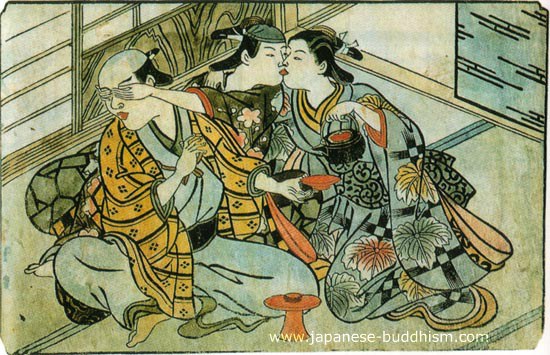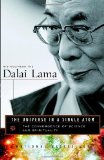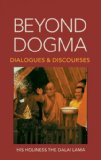Homosexuality and Buddhism
Homosexuality and Buddhism are not incompatible. Gays, lesbians and even trans-gendered are welcome by the Buddha. It is one of the only religions open to the idea.
Indeed, homosexuality is accepted for the lay person. If one wants to be ordained, all sexual intercourse are banned so it doesn’t matter if your a homosexual or not, you will not be active.

Sexuality in the Buddhist texts
In Buddhist texts, especially the Vinaya, four genders are described: Male, female, ubhatovyanjañaka and pandaka.
ubhatovyanjañaka is accepted as meaning anyone who has both male and female sexual characteristics: hermaphrodites. It is specified that hermaphrodites should not be ordained, on account of the possibility that a hermaphrodite would entice a fellow monk or nun into having sex. Many later texts include in the category people who are not physically hermaphrodites but also are mentally of the other sex. For example, a someone in a woman’s body who feels like a man inside.
5th century Buddhist writer Buddhaghosa describes ubhatobyanjanaka as people with the body of one gender but the “power” of the other, often accepted as meaning gays and lesbians.
The pandaka is a complex category and there are many commentators who tried to define it. In the earliest texts, it meant that the person belonged to a socially stigmatized class of transvestite homosexuals, who were possibly prostitutes.
Pandaka are categorized with others who are also excluded from ordination; either those with physical abnormalities such as deafness or dwarfism, or those who have committed crimes.
This category was expended to include most other sexually deviant or marginal people, voyeurs, sodomite, impotents, eunuchs and other people with ‘abnormal’ physical or mental sexual characteristics are among them.
The reason for this is usually accepted as being because Buddha wanted the Sangha to be socially recognized as of the upmost respectability.
The Pandaka are often excluded from a variety of Buddhist practices (in addition to ordination):
- acting as preceptors in ordination ceremonies
- making donations to begging monks
- being preached to
- meditating and
- ability to understand the Dharma.
Homosexuality and Buddhism In Japan
 In Japan, bisexuality and homosexuality was widely accepted and fairly common, especially among the monk class.
In Japan, bisexuality and homosexuality was widely accepted and fairly common, especially among the monk class.
It has been observed by early Christian missionaries that the prevalence and acceptance of forms of homosexuality among Japanese Buddhists.
Jesuit priest Francis Cabral wrote in 1596 that “abominations of the flesh” and “vicious habits” were “regarded in Japan as quite honourable; men of standing entrust their sons to the bonzes to be instructed in such things, and at the same time to serve their lust”.
In general society, and in temples, bi-sexuality was accepted as normal and some famous monks were famous for being homosexuals.
Among them: Kukai, the founder of Shingon (might not be true), Zen monk Ikkyu Sojun (1394–1481), and 17th century Japanese Buddhist scholar, Kitamura Kigin.
It seems that same sex sexual intercourse was prevalent in monasteries, especially when one of the partner was a young, pretty boy.
Homosexuality and Buddhism in the West
Since its introduction in the West, Buddhism has been at the avant-garde of social issues and especially since the 1990s, gender roles and sexual orientation have been widely discussed and generally accepted.
When talking and homosexuality and Buddhism, Western Buddhists often emphasize the importance Buddha placed on tolerance, compassion, and seeking answers within one’s self. For them, these values are more important than examining specific passages or texts.
Many people think that homosexual relationships are no better or worse than heterosexual relationships and that only unhealthy relationships in general are to be avoided.
Some associations in the United States perform same-sex marriage. Among them are: SGI announced in 1995 that they would start holding wedding ceremonies for same-sex couples;
A Buddhist temple in Salt Lake City connected with Jodo Shinshu, another Japanese school of Buddhism, also holds religious rites for same-sex couples.
The Dalai Lama’s point of view
The Dalai Lama has been asked numerous times his point of view about  homosexuality and Buddhism and his answer changed through the years.
homosexuality and Buddhism and his answer changed through the years.
In general his point of view is that inappropriate sexual behaviour includes lesbian and gay sex, and indeed any sex other than penis-vagina intercourse with one’s own monogamous partner, including oral sex, anal sex, and masturbation.
In 1994, he stated in an interview with OUT magazine that “If someone comes to me and asks whether homosexuality is okay or not, I will ask ‘What is your companion’s opinion?’ If you both agree, then I think I would say ‘if two males or two females voluntarily agree to have mutual satisfaction without further implication of harming others, then it is okay’“.

In 1996, though, in his book Beyond Dogma: Dialogues and Discourses he stated that “A sexual act is deemed proper when the couples use the organs intended for sexual intercourse and nothing else … homosexuality, whether it is between men or between women, is not improper in itself. What is improper is the use of organs already defined as inappropriate for sexual contact.”
Now, the Dalai Lama has repeatedly “voiced his support for the full recognition of human rights for all people, regardless of sexual orientation.’ and doesn’t not condemn homosexuality. He basically says that the sexual act itself is not approved of by Buddhism but that the person is not condemned.
To this effect, he says that he can’t rewrite the texts. He thinks that this is the type of issue that would need to be discussed by a council of Buddhist elders from all Buddhist traditions. Only such a council could amend issues concerning Vinaya and ethics. The Dalai Lama also recommends the issue of the equality of women, particularly in monastic rituals and ceremonies, to be reconsidered and revised.
In conclusion
The homosexual act is considered against the basic Buddhist precepts, as killing a sentient being or lying. The act might prevent you from attaining illumination as long as you are attached to it, like many other attachments but it doesn’t prevent you from seeking illumination.
Thus, it doesn’t make an homosexual a non-Buddhist. It just makes him or her a suffering being, at the same level as a lier is a suffering being or someone who killed a mosquito, or even the man who likes having heterosexual intercourse with many partners.
The best way to be a Buddhist is to follow, as much as possible, the eightfold noble path.
Finally, if I wasn’t clear before: homosexuality and Buddhism are not incompatible. Not perfect, but not forbidden.
Have A Great Story About This Topic?
Do you have a story or an opinion about this? Share it!
|
Return from homosexuality and Buddhism to Social issues and Buddhism Return from Homosexuality and Buddhism to Japanese Buddhism- Home |

New! Comments
Have your say about what you just read! Leave me a comment in the box below.